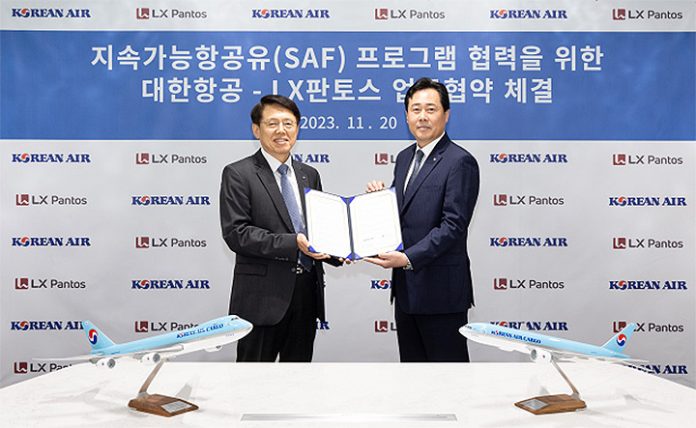
-
Korean Air, LX Pantos sign MOU to expand the use of sustainable aviation fuel for its cargo flights
-
More carriers explore integration of sustainable aviation fuel into their operations
-
Philippine Airlines is actively exploring the use of SAF, according to its spokesperson
-
Cebu Pacific in September 2022 used SAF blend for a flight from Singapore to Manila, becoming the first Philippine carrier to use SAF in its commercial operations
Korean Air (KAL) is partnering with logistics firm LX Pantos to expand the use of sustainable aviation fuel (SAF) in its cargo flights even as more carriers explore the integration of the eco-friendly fuel into their operations.
Under a memorandum of understanding signed at KAL’s headquarters on Nov. 20, both companies have agreed to reduce greenhouse gas emissions in the cargo industry and foster awareness of SAF usage within Korea. LX Pantos will purchase SAF for Korean Air’s cargo operations, and Korean Air will share the amount of carbon emissions reduced accordingly.
The MOU signing was attended by Jaedong Eum, senior vice president and Head of Cargo Business Division at Korean Air, and Keun Taek Oh, Vice President and Head of Air Freight Business Unit at LX Pantos.
“We are delighted to welcome LX Pantos as our first partner in the joint initiative for the future of sustainable aviation fuel (SAF). Together, we hope to cooperate closely to expedite the commercialization of SAF, a common goal in the aviation industry, and enhance awareness of SAF utilization in the Korean market,” Jaedong Eum, KAL’s head of Cargo Business Division, said in a statement.
“Decarbonizing the air logistics industry is a key survival factor for the future,” said Oh. “LX Pantos will strengthen its ESG activities and take a leading role in creating a sustainable logistics environment through cooperation with Korean Air on SAF.”
KAL initiated a cargo SAF program in September, actively working on establishing the necessary infrastructure for SAF usage in domestic aviation.
The program included six test flights from September to November, with plans to share results with the government to inform the setting of SAF blending ratios and quality standards.
In the Philippines, Philippine Airlines (PAL) is actively exploring the use of SAF due to its potential to lower carbon emissions, spokesperson Cielo Villaluna told a state news agency on November 20.
PAL president Stanley Ng discussed the initiative with business delegates during the recent Asia-Pacific Economic Cooperation Summit in San Francisco, California, Villaluna added. Ng’s plan is to source SAF from cost-efficient suppliers, with a target implementation date set for 2030.
Ng emphasized PAL’s commitment to collaborate with stakeholders to explore various means of producing more SAF, making it more affordable and accessible for the airline industry.
Meanwhile, low-cost carrier Cebu Pacific operated its first flight using SAF in September 2022, becoming the first Philippine carrier to use SAF in its commercial operations. The Singapore to Manila flight on an Airbus A321neo used 35% blended SAF.
The carrier also signed an agreement to explore SAF supply and purchase from Neste, a Finland-based leading producer of SAF.




